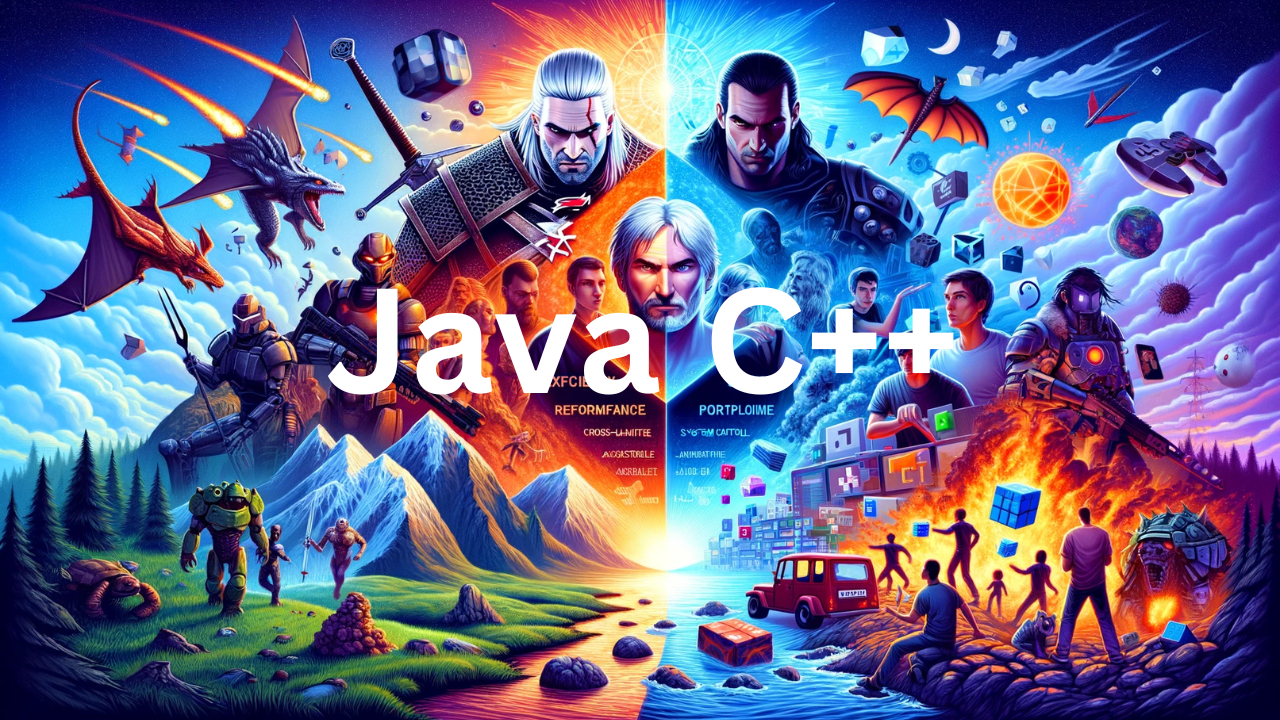
Ever wondered how your favorite video games come to life? Well, a lot of it boils down to the programming languages used to create them. Two of the most significant players in the game development world are C++ and Java. These languages have been the backbone of many popular games, offering unique advantages that make them ideal for different aspects of game development. Let’s dive into the roles of C++ and Java in gaming, with some examples to illustrate their impact.
The Role of C++ in Game Development
Performance and Efficiency
C++ is known for its performance and efficiency, making it a favorite among game developers. This language allows developers to manage system resources closely and optimize performance, which is crucial for creating smooth and responsive games.
Examples of Games Programmed in C++
- The Witcher 3: Wild Hunt – This critically acclaimed game, developed by CD Projekt Red, uses C++ to handle its complex graphics and gameplay mechanics. The language’s efficiency helps render the game’s expansive open world and intricate details seamlessly.
- Doom (2016) – Developed by id Software, Doom uses C++ to deliver fast-paced, high-performance gameplay. The language’s capability to manage resources effectively ensures that players experience minimal lag, even during intense action sequences.
- Grand Theft Auto V – Rockstar Games utilized C++ to create this massive open-world game. The language’s powerful performance handling is key to managing the game’s detailed environments and complex AI behaviors.
The Role of Java in Game Development
Cross-Platform Compatibility
Java is prized for its portability and ease of use. “Write once, run anywhere” is Java’s mantra, meaning a game developed in Java can run on any device that supports the Java Virtual Machine (JVM). This makes it an excellent choice for developing cross-platform games.
Examples of Games Programmed in Java
- Minecraft – One of the most famous games developed in Java, Minecraft by Mojang Studios, leverages Java’s cross-platform capabilities to allow players to build and explore virtual worlds on various devices, from PCs to mobile phones.
- Runescape – This popular MMORPG, developed by Jagex, uses Java to run on multiple platforms. Java’s portability ensures that players can access the game from various devices, maintaining consistent gameplay experiences.
- Star Wars Galaxies – Though now defunct, this MMORPG by Sony Online Entertainment used Java for its server-side components, showcasing Java’s strength in managing complex online interactions and real-time gameplay.
Comparing C++ and Java in Game Development
Performance vs. Portability
- Performance: C++ offers unparalleled performance and control over system resources, making it ideal for high-end, resource-intensive games. It’s particularly useful in console and PC gaming, where hardware can be pushed to its limits.
- Portability: Java shines in its portability and ease of development. Its ability to run on any device with a JVM makes it perfect for mobile games and games that need to be accessible across different platforms.
Complexity vs. Simplicity
- Complexity: C++ is a more complex language, requiring developers to manage memory manually. This complexity can lead to more optimized and efficient code but requires a higher level of expertise.
- Simplicity: Java’s automated memory management (garbage collection) simplifies the development process. This makes Java more accessible to new developers and can speed up the development cycle.
it’s here C++ vs java has to know.
Conclusion: Choosing the Right Language for Your Game
The choice between C++ and Java ultimately depends on the specific needs of your game project. If you’re developing a high-performance game that demands precise control over system resources, C++ is likely your best bet. On the other hand, if you’re looking to create a cross-platform game with a quicker development process, Java might be the way to go.
Both languages have their strengths and have contributed significantly to the gaming industry. By understanding the roles and advantages of C++ and Java, developers can make informed decisions that best suit their game development goals.
Different b/w C and C++ increase your skill
FAQs:
Q: Why is C++ preferred for high-performance games? A: C++ allows developers to manage system resources closely, optimizing performance and ensuring smooth gameplay.
Q: What makes Java suitable for cross-platform games? A: Java’s portability allows games to run on any device with a JVM, making it ideal for cross-platform compatibility.
Q: Can beginners learn game development with these languages? A: Yes! While C++ is more complex, it’s powerful for high-end games. Java is simpler and great for cross-platform games, making it accessible for beginners.

